Memorable Game: 1966 NFL Championship Game
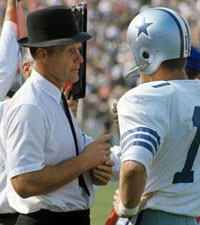
Tom Landry talks to his quarterback
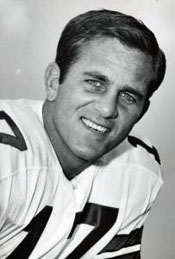
Don Meredith
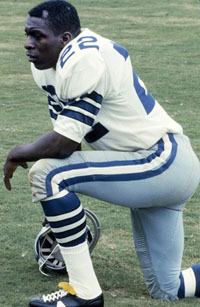
Bob Hayes
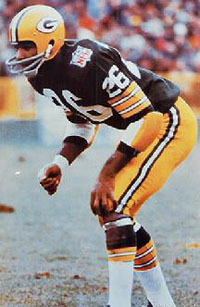
Herb Adderley
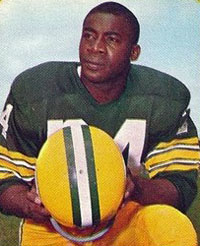
Willie Wood
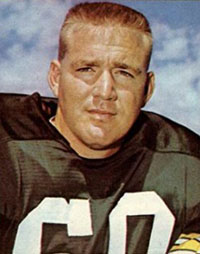
Lee Roy Caffey
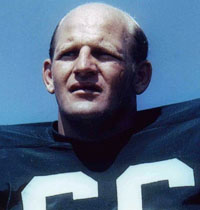
Ray Nitschke
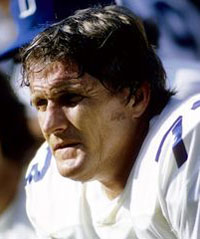
Ralph Neely
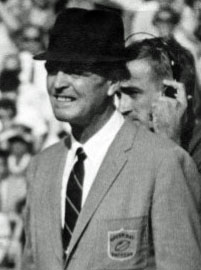
Phil Bengston
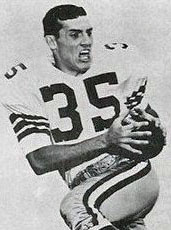
Pete Gent
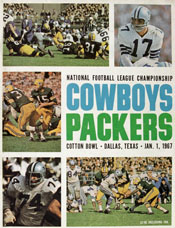
|
The Dallas Cowboys finally won the Eastern Division of the NFL in 1966.
In the West, the Packers won their third straight title.
The championship game matched head coaches who had spent five years together (1954-58) on the New York Giants staff.
- Proud and competitive men, Lombardi and Landry, offensive and defensive coordinators to apply today's terminology to that bygone age, competed against each other as much as they did the opponents. Given complete autonomy in their respective spheres by figurehead coach Jim Lee Howell, they vied to gain an edge with Howell in strategy decisions that affected their realms (such as going for it on fourth down and possibly putting the defense in a hole).
- Lombardi left for Green Bay for the '59 season, and the following year Landry became the coach of the expansion Cowboys.
- Tom developed his "Flex" defense. Working within the 4-3 scheme, he moved one or more down lineman a yard behind the others based on what the offense was expected to run.
- His first few years in Big D, it wouldn't have made any difference what alignment he used. But as the Cowboys, aided by the first computerized scouting system, improved their personnel through the draft, the Flex got better and better.
- No coach in the NFL spent more time studying Lombardi's offensive system than Landry, who yearned to build a dynasty in Dallas like the one his former Giants colleague had developed in Wisconsin. And Lombardi kept tabs as best he could on what Landry was doing with his East Division club.
- Their teams had met three times with the Packers winning every time.
1960: 41-7 over the first year Cowboys
1964: 45-21 in Dallas
1965: 13-3 in Green Bay
The decreasing margin of victory—4, 24, and
10—bespoke the improvement in Landry's club.
With no tie in either division, the East and West champs enjoyed two weeks to prepare for the title clash. The game held added significance because the winner would play the AFL champions in the first Super Bowl.
- Lombardi and his alter ego, Starr, knew that the Flex would present a serious challenge.
- They pinpointed Lilly, as strong and quick a defensive tackle as you could find, as the key to making headway against the Cowboys.
- Knowing Tom would be studying his offense as much as he viewed films of Dallas's defense, Lombardi decided to prune his playbook, adding nothing new but running plays from different formations.
Green Bay ran plays out of either the red formation (when the fullback lined up directly behind the quarterback) or the brown formation (when the halfback and fullback lined up split behind the quarterback). Normally, the Packers ran their patented end sweep exclusively to the right out of the red formation and to the weak side out of the brown formation. Vince/Bart decided to reverse that tendency. The move would pay off on the very first play from scrimmage.
The Cowboys also singled out a Packer defender for extra attention.
- MLB Ray Nitschke became the focal point of Landry's offensive game plan. T Ralph Neely: Any time we played the Packers, our number-one priority was blocking Ray Nitschke. We knew if we were going to be successful, we had to block Nitschke.
- Green Bay's front four tried to shield blockers from Nitschke to allow him to get to the football. Neely: He could make tackles from one side to the other. He was a great football player in a great scheme. You had to account for him, you had to have someone assigned to him. They had a lot of good football players, but he was the key to their defense; he was in control of everything. He was the guy who knew formations, he was the guy that got everybody in the right position ... He was not only a tough guy, he was an extremely bright football player. ... You weren't going to be successful against Green Bay if you didn't account for Ray.
- In sharp contrast to the Packers, the Cowboys implemented the most complex offense in the NFL. Neely: We had 18 to 20 formations and 18 to 20 plays out of each formation.
- Green Bay D-coordinator Phil Bengston dealt with Landry's multiple offense by staying as basic as possible. He kept his schemes simple to give his defenders freedom to make adjustments and play with confidence. We emphasized the basics, recalled Bengston. I always emphasized that it's not the plays, it's the players.
- He wanted his unit to hold their ground against the Cowboys' shifting formations and bracket Olympic sprinter Hayes short and long with Adderley and S Tom Brown.
- Landry didn't expect to beat a defense as good as Green Bay's with myriad formations, but he did want to create a moment of hesitation.
Nitschke: It was a good test. That was a well-coached Landry team. They had it all. But we were prepared for anything they did. Bengston was a real perfectionist, just like Lombardi. He ran the defense, and Lombardi ran the offense, but Phil never got the credit he deserved. He kept it simple for us.
The specter hanging over the Cowboys offense was the disconnect between Meredith and Landry.
- If Dallas's scouting software had included a criterion for compatibility with the head coach, Meredith would never have become a Cowboy.
Many consider Meredith to be the Original Cowboy, although he wasn't actually drafted by the club.
The expansion franchise was admitted into the league too late to participate in the 1960 NFL Draft. However, Don signed a "personal services" contract with owner Clint Murchison in November 1959, one month prior to the draft. Bears owner George Halas, wanting to help the new club get off to a good start, chose Meredith in the third round (3second pick overall). The league honored Don's contract but made the Cowboys compensate the Bears with a third-round pick in the 1962 draft. So Landry had no say-so in the selection of Meredith but rather inherited him as his quarterback.
- As Skip Bayless put it, Dandy Don and Landry were as different as Saturday night and Sunday. Meredith was as country cool as Landry was country-church rigid. ... Meredith didn't take the game so seriously that he sacrificed his bourbon and smokes and many female admirers. ... Meredith probably took losing as hard as Landry did, but it wasn't his life. ... Meredith played more for his teammates than for credit. He played with cracked ribs and a collapsed lung mostly because his buddies needed him. Winning, as a team, satisfied him even more than anything he could touch or taste.
- Probably to Landry's chagrin, the Dallas players loved Don. WR Pete Gent: You can't imagine how much this team loves that guy. Hayes: We loved him because he had taken so much abuse. He would go out there and play for you when he should have been in a hospital.
- Like Paul Brown, Landry didn't want his quarterback to make his own decisions. Tom wanted his signal-caller to be a robot executing what the coach programmed him to do in each situation. If Meredith made a change at the line of scrimmage, the play had better work.
- Many times, Landry not-so-subtly made Meredith the scapegoat for defeats. In his post-game comments, Tom would make statements like, We had the right play called but we didn't make the right read or We had the guy open but we didn't make a good throw. While he said "we," it was obvious that what he meant was, I had the right play called but my quarterback didn't make the right read or a good throw.
Since the forecast for Green Bay called for extremely cold weather the week before the championship game, Lombardi took his team to Tulsa OK to complete preparations.
- The plan nearly backfired. Starr recalled: As luck would have it, we reached Oklahoma at the tail end of a snowstorm. When we went to the stadium of a local university to work out, the field was covered with snow and ice.
More from Bart: "If we needed a light moment, we received it after discovering a unique approach to snow removal. As we headed out for our first practice, we witnessed a young man driving a Cadillac with a bench tied to the rear bumper.
- Fortunately, the weather improved dramatically during the week, and the Packers felt they were extremely well prepared for the Cowboys when they flew to Dallas the Friday before the game.
Starr after his retirement from football: Coach Lombardi did a brilliant job of getting us ready for every game we played, but I don't think he ever did a better job than he did preparing us for .. Dallas in 1966. We had the luxury of two weeks to get ready for that game, and with that much time to study the movies, Coach Lombardi cut all the fat out of our offense. Our game plan against Dallas included eight or ten running plays and about eight passing plays, and that was all ... We had only the plays that Coach Lombardi was positive would work against the Dallas defense ...
- While in Tulsa, Lombardi had to deal with a story that appeared five days before the title game. Sportswriter Steve Perkins, covering the Packers in Tulsa for the Dallas Times Herald, reported that Vince told him, I might make this my last season because the work load was so great. The quote was circulated to newspapers across the nation by the Associated Press. I think he misunderstood me, Lombardi, whose contract had been extended through 1973 the year before, told a throng of newsmen the next day. I do believe the job has become more demanding, but I have no intention of quitting. I'll retire some day. Who is to say when that will be.
- The Packers, twelve of whom had played in the title game four previous times, claimed they had never been tenser. However, Lombardi, as he usually did during game weeks, became more relaxed on Friday. The hay is in the barn, he said upon arriving in Dallas. The team is ready. If they play as well as they know how to and lose, it will not be the end of the world. There is nothing I can do now to change anything. Losing might not have been the end of the world, but Vince would find losing to Landry would be quite painful.
According to Dallas WR Buddy Dial, one offensive innovation Landry wanted to put in for the Packers didn't get off the drawing board. Coach Landry had our whole (offensive) team together. He was up at the blackboard, and Bobby Hayes and Meredith and I were sitting at the back of the room. ... Landry said, "All this year, Bobby, you have been going deep and Dial and Gent have been coming across the middle." And he said, "This week for Green Bay, Dial, you and Gent are going to do deep, and, Bobby, you're going to come across the middle," and from the back of the room we heard Bobby Hayes say, "Shiiiiiiiit." Hell, Landry nearly dropped the chalk. We all fell out of our chairs when Bobby said, "Shiiiiiiiit." And in that game he did not run across the middle.
- Meanwhile, the Cowboys, the youngest team in the NFL, assumed an air of casualness, perhaps to mask the anxiety they felt as they approached their first championship tilt. Meredith told reporters: Personally, I don't think our players feel nearly as much pressure as we felt before Cleveland on Thanksgiving Day. That was a game we had to win so we could win another game [St. Louis] so we could be in a position to be here in the first place. We've been thinking about this for a long time, challenging Green Bay for the title. Our workouts have been excellent. Our preparation has never been better. Pete Gent echoed Don's thoughts. Coach Landry has gone about this as if it were any other game. No trace at all of nerves or doubt. I think that is because he really believes in us and our ability; we believe in ourselves.
Despite his air of confidence, Meredith had given his teammates a jolt early in the week when he was rushed to the hospital with severe stomach cramps. It turned out to be nothing more than nerves. The outwardly happy-go-luck quarterback's insides were tied in a knot.
|
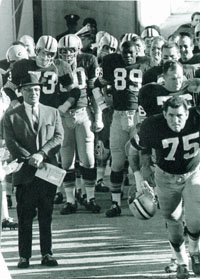
Forrest Gregg introduced
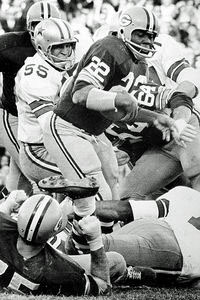
Elijah Pitts runs past Lee Roy Jordan.
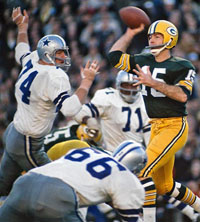
Starr passes in early action.
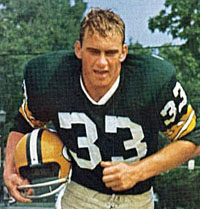
Jim Grabowski
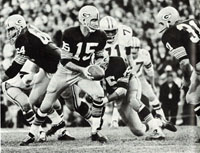
Starr hands to Taylor.
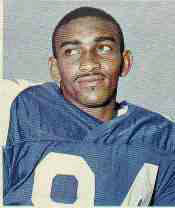
Pettis Norman
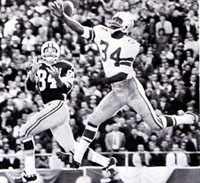 Cornell Green just misses the touchdown pass to Carroll Dale.
Cornell Green just misses the touchdown pass to Carroll Dale.
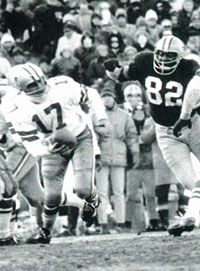
Meredith tries to escape Lionel Aldridge.
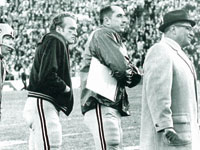
Starr, Paul Hornung, Zeke Bratkowski, and Lombardi watch the action.
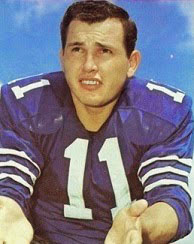
Danny Villanueva
|
Sunday, January 1, 1967, brought clear, 50-degree weather for kickoff. 74,152 gathered for the most important game in Dallas's young history. The Cowboys took the field as seven-point underdogs.
- First Quarter
The game couldn't have started more disastrously for the Cowboys. Green Bay took the kickoff and drove right down the field for a touchdown. Starr started with a play he helped design to sucker the Doomsday Defense. The Packers lined up in the red formation. So the defense expected a sweep to the right. Instead, Starr faked to Taylor going wide and handed to Elijah Pitts who burst through a big hole up the middle for 32y to the Dallas 44.
Starr: We had a special play to open the game. We put the counter in to defeat the pursuit. I faked a handoff to Taylor going one way, and when the Cowboy defense reacted to his movement, I handed the ball to Elijah Pitts, cutting back in the other direction against the grain o the pursuit.
T Bob Skoronski later explained, Actually, it was an old play, but the blocking was different. Vince was very good at watching film and designing a game plan. He had a great eye for that. He really could find things. It was completely backwards to what the Cowboys must have expected. They had no idea what we were doing to them. Vince was excited all week that it was going to work, and it did. No one ever noticed the flex defense like he did. That was his baby.
After Starr hit WR Carroll Dale for nine, Taylor gained four to earn another series of downs. But the Flexers asserted themselves at that point. CB Cornell Green batted down a pass, and Bob Lilly chased down Taylor on a screen pass for a 4y loss. But no one was better than Starr on third down. He threw to Dale, who made a juggling catch to the 20 to move the chains. After Taylor gained three, Pitts circled out of the backfield and was wide open in the center of the defense. He took Starr's pass on the seven, bounced off CB Warren Livingston, and spun into the end zone. Packers 7 Cowboys 0 (10:51)
Dallas MLB Leroy Jordan: We were trying to do too much defensively in the secondary. Under the game plan, we were trying to set up our defenses depending on how wide the split end was set. ... And the first time the Packers got the ball, Dowler moved from a wide position to a closer position, and I didn't see it, didn't hear the call, and so I played the defense for his original position, and in the spot where I was supposed to be, Elijah Pitts caught a pass for a 17-yard touchdown. If I'd have been playing the right defense, I'd have come his way, but because of my mistake it left a big hole in the area where the HB was running, and Bart Starr picked it up and hit the right guy, and boom, it was a touchdown.
Then disaster struck the home team on the kickoff. Mel Renfro took the ball at the goal line and ran out to the 15 where rookie T Robert Brown reached out and dislodged the ball. It rolled toward the sideline until second-year FB Jim Grabowski, who had made his mark on special teams while backing up Taylor, picked up the pigskin and ran untouched to pay dirt. Packers 14 Cowboys 0 (10:40)
Grabowski: My feet never touched the ground. I floated back to the sidelines.
Could the young Cowboys keep their poise after falling behind two scores before they even ran a play? The answer was a resounding YES. Using the wrinkles they put in for the game, Dallas drove 65y to cut the deficit in half.
Dallas adjusted its attack to take advantage of Green Bay's stunting, sliding defense. Instead of pulling their guards and trapping as was their style, the Cowboys would use zone blocks to allow RBs Dan Reeves and Don Perkins to run to daylight.
This time Renfro got off a good return of 27y to the 35. HB Dan Reeves and small but quick FB Don Perkins gained 11 on successive runs. Two plays later, Dallas had another first down on a flat pass to Pete Gent to the Green Bay 43.
Gent was one of those rare pros who did not play college football. Instead, he played basketball at Michigan State, leading the Spartans in scoring all three years. Impressed by his athleticism, the Cowboys offered him a tryout in 1964. At first, the coaches put him at defensive back but soon decided that, at 6'4" 210 lb, he was better suited for wide receiver. When he made the team, he turned down an offer from the Baltimore Bullets of the NBA.
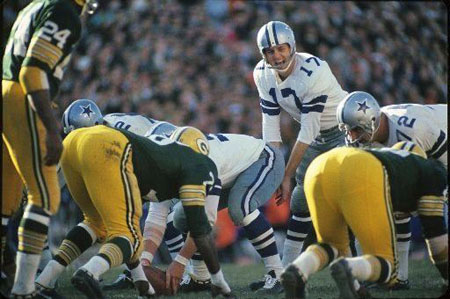
Meredith calls signals.
During the touchdown drive, Hayes caught a pass for a 1y gain. It would be his only reception of the day.
Perkins was known as an exceptional blocker. He took on linebackers outweighing him by 30 pounds and rarely failed to move them out.
It was now Green Bay's turn to mess up a kickoff return. Donny Anderson tried to catch the ball near the sideline but fumbled out of bounds at the 13. The Dallas defense asserted itself and sacked Starr at the six on third-and-10.
Starting from their 41 after the punt, the Cowboys drove to the tying touchdown with Perkins leading the charge. On two successive runs, he gained a first down at the Green Bay 44. After Reeves took a pass to the 22, Don took a handout over right tackle, broke into the secondary, burst between two tacklers, and set sail for the goal line. LB Lee Roy Caffey and CB Herb Adderley tackled him from behind inside the five, but the ball carrier fell on the stripe. Packers 14 Cowboys 14 (0:36)
The touchdown play succeeded because MLB Nitschke followed Reeves, who ran right as if taking a pitchout on a sweep. Ray was caught flatfooted when Perkins took Meredith's handoff on a counter and exploded through a gaping hole much as Pitts had done on the first play of the game.
Fourteen NFL opponents had scored a total of 13 points against the Packers in the first quarter. Dallas got 14. Also Green Bay had not allowed 14 points in an entire championship or playoff game since the 1960 loss in Philadelphia.
The Cowboys were running traps and misdirection plays inside, confusing Nitschke with false keys and reads. CB Herb Adderley: When you get the middle linebacker confused and going the wrong way, that makes it real tough on the defensive backs to come up and make the play.
On the sideline, Lombardi told his D-coordinator: Hey, Phil! Shake up those linebackers!
When the defense came off the field angry and agitated, OG Fuzzy Thurston came over to calm them down. Hey, don't worry about it. We'll get it back. Don't worry about it.
The period ended with Green Bay facing second-and-two on their 44.
- Second Quarter
After an offside gave the Packers a first down, Starr threw long to Dale streaking down the middle. Green came over and appeared to have a chance to intercept but seemed to misjudge the ball as it sailed over his grasp into Carroll's arms for a 56y touchdown. Packers 21 Cowboys 14 (14:49)
LB Leroy Jordan was so sure Green was going to make the interception that he turned upfield to lead interference and didn't see the touchdown.
Cornell: It was a good pass. I thought I could intercept. We needed an interception badly.
Dallas came right back with a drive deep into Green Bay territory. The initial first down came on Meredith's 10y pass to Gent to the 39. Two plays later, Hayes, split wide, took two defenders with him over the middle as Reeves swung out of the backfield and was all alone to take Meredith's deft pass. RCB Bob Jeter pushed Dan out on the 21. Two Reeves runs moved the ball to the 14. Then Meredith rolled right and decided to keep it but was stopped 1y short of the first down by Davis and Lionel Aldridge. So for the second time in the half, Landry gambled on fourth down and won as Perkins smashed over the right side to the nine. But two Reeves runs gained only five and Meredith's pass to second TE Frank Clarke floated out of bounds. So Danny Villanueva came on and booted an 11y field goal. Packers 21 Cowboys 17 (8:37)
Green Bay quickly moved across midfield on Pitts's 24y scamper to the Dallas 46. Then the Pack converted third-and-one on a short pass to Taylor to the 25. But on the next third down, Starr failed to connect with Pitts. So Don Chandler tried a 30y field goal that was partially blocked and rolled into the end zone.
The defenses dominated the remaining minutes.
HALFTIME SCORE:
Packers 21 Cowboys 17
Landry explained Green Bay's offensive success. The Packers were using a lot of counter moves out of the backfield. They were crossing their backs, and it seemed to confuse us in the first half. And Starr was throwing so well. That was the deciding factor. I was surprised there was this much scoring, but both offenses were executing very well.
The Cowboys made adjustments for the second half and did an effective job shutting down the Packers' running attack.
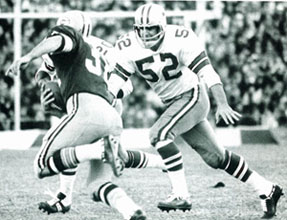 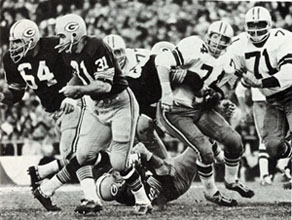
Taylor gains some of his 37y on the day. Note Bob Lilly being held. |
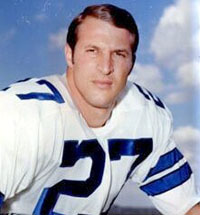
Mike Gaechter
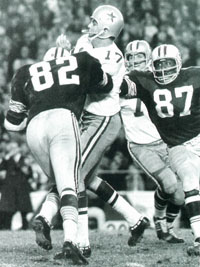
Lionel Aldridge and Willie Davis crunch Meredith.
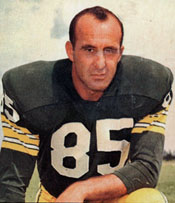
Max McGee
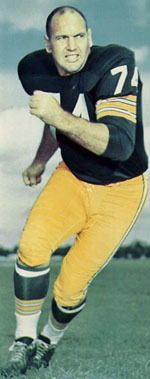
Henry Jordan
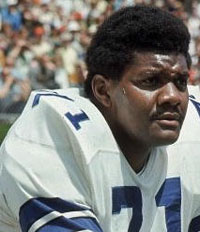
Willie Townes
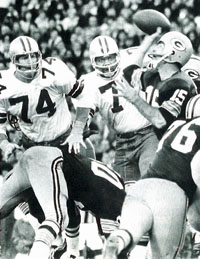
Starr passes from the pocket.
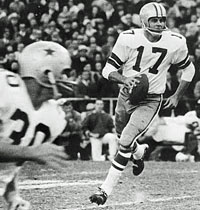
Meredith rolls out.
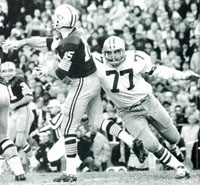
Jim Colvin reaches for Starr too late.
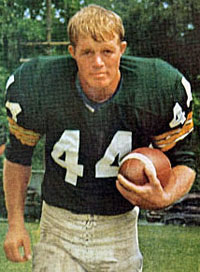
Donny Anderson
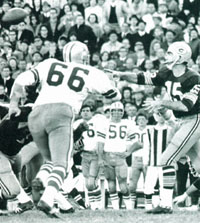
George Andrie can't get to Bart.
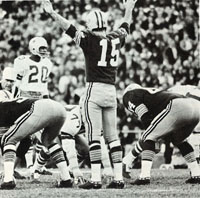
Starr asks for quiet on Packers' last possession.
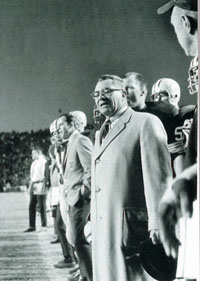
Lombardi watches the goal-line stand.
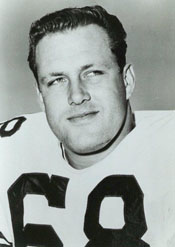
Jim Boeke
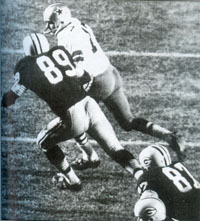
Dave Robinson chases Meredith on the final play as Willie Davis brings up the rear.
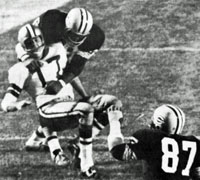
Robinson throws down Meredith, who has just thrown the ball.
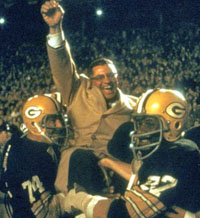
Lombardi exults with Henry Jordan and Willie Davis
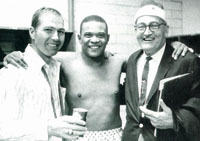
Bart Starr and his father with Bob Jeter
|
- Third Quarter
After stopping the Cowboys, the Packers marched smartly into enemy territory.
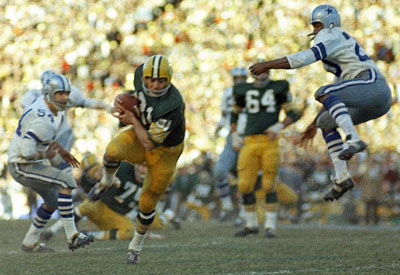
Jimmy Taylor receives a pass over a leaping Mel Renfro.
Lombardi: I thought the fumble by Pitts could have ended up the turning point. We were on our best drive of the day when it happened.
The Cowboys then went on a 13-play drive that led to three points. Meredith got the Cowboys off to a good start when he converted the first third down of the half by lofting a nice pass to Reeves to the Green Bay 38. Don then rolled out to the 26 to move the chains again. But three downs gained nothing. The second down play was a pass that had touchdown written all over it. But Willie Wood slapped the ball away from Reeves at the last moment. So Villanueva banged through a 32-yarder. Packers 21 Cowboys 20
The Packers answered the field goal with a 74y touchdown drive. Starr began with a heave to Dale to the Dallas 31. After two Taylor runs made it third-and-one, the defense gave up the first down without an effort on an offside penalty. After Pitts gained a yard, Starr stepped up in the pocket and found Dowler cutting across the middle. The 6'5" wide receiver made a lunging catch at the goal line and careened into the end zone. He was a good 5y into the end zone when S Mike Gaechter threw a body block that Dowler tried to jump to avoid. That caused him to land on his shoulder. The Packers were upset at the late hit. Teammates had to restrain Taylor to keep him away from Gaechter. Packers 28 Cowboys 20
Since no team had scored more than 23 points on Green Bay all season, Dallas faced an uphill battle.
The period ended after Renfro returned the kick to the 35.
- Fourth Quarter
The Cowboys made one first down on their possession at their 46. But three straight incompletions forced a punt to the Green Bay 26.
Starr went right back to Dowler to the 49. This time, Boyd stayed down and left the game. Veteran Max McGee replaced him and, two snaps later, dropped a pass in his midsection. The Cowboys swarmed over Starr at the 46. Chandler boomed a punt to the goal line. Hayes foolishly caught the ball as his momentum carried him into the end zone. He could have downed it but instead was dumped at the one.
Hayes: I didn't know I was that far back. All I was thinking, we needed field position, and I thought I could get a runback.
Dallas ground out a first down on the 14, but two incompletions and a sack by DT Henry Jordan put them back at the six. Villanueva got off his best punt of the day. Anderson fair-caught the ball at the 48 with 9 1/2 minutes left.
The Packers went backwards when Pitts was thrown for a 2y loss, and George Andrie sacked Starr at the 43. But on third-and-17, Bart connected with TE Marv Fleming to the 33. On the next series, the cagy quarterback converted third-and-12 with a toss to Taylor to the 19.
And darn if the same sequence didn't occur again. The Flexers won first and second down, Willie Townes dumping the quarterback for an 11y loss to the 28. On the next snap, as LT Skoronski pushed RE George Andrie wide to protect the pocket, Bart found McGee a step ahead of Livingston at the two. Warren tackled Max as he fell over the goal. On the PAT, 6'6" Jethro Pugh got a hand on Chandler's boot to keep the deficit at 14, which was crucial since the NFL, unlike the AFL, did not permit the two-point conversion. Packers 34 Cowboys 20 (5:20)
Before the touchdown play, McGee told Starr in the huddle, I can beat Livingston on a zig-out. Give me a shot.
Starr: Max was always thinking. In our game preparation, we noticed that Livingston, Dallas's right corner, tended to overplay the middle on a post route. Lombardi and I had discussed taking advantage of it inside the Cowboys' 30. At the snap, Max cut to the middle and then broke to the outside. I couldn't believe how open he was when I threw to him for an easy score ...
Down by 14 for the second time in the game, the Cowboys desperately needed a touchdown. Meredith converted a third-and-two with his feet, running out of the pocket to the 42. Following an incompletion, Don made two straight clutch plays. First, he hit Reeves in the flat, but Dan fumbled when hit. As the ball rolled free, who should come racing over to bat it out of bounds but the quarterback! The only problem was the pigskin went out at the 31 to bring up third-and-20. No problem. Don faded back and, with excellent protection on an obvious passing down, saw TE Clarke running free down the right hashmarks. Frank gathered in the perfectly thrown ball at the 30 and eluded the grasp of the diving Jeter at the six to complete the sensational 69y touchdown that brought the Cowboys back from the dead. Packers 34 Cowboys 27 (4:09)
A member of the original 1960 Cowboys after three seasons with Cleveland, Franklin Delano Clarke grew up a Packer fan in Beloit WI. He recalled his touchdown this way: The play was red right motion X post. The offensive formation was red right, where I'm at the tight end spot. ... and what happened was, when Danny Reeves went in motion to the right, Packers LB Dave Robinson, who was on my nose, went with the motion man, so it left me uncovered. Now I take off, and I have this wonderful shot at DB Tom Brown; I'm looking right at Tom Brown's number, ... nobody to mess with me ... and I make this great inside move, and he goes for it. And then I make another move toward the corner, and he recovers, but as he's recovering the greatest thing that could happen to an offensive receiver happened: the defensive back fell down. He tripped over his own legs trying to keep up with the offensive move ... and now I break toward the post, and nobody is near me. ... the key to it was what Bob Hayes was doing over on the other side and what Dandy did. Bob Hayes was split wide to the left on Bob Jeter, and he went down, and he did a great sideline route, and then looked like he was going up ... like he was running a fly route. [Meredith looked to his left until right before he threw the ball.] This momentarily made Willie Wood, the weak safety, hesitate ... and that's all it took, because by the time Meredith put that ball in the air, Willie Wood, with his great speed and ability, was not able to come over in time to catch me running the post route. ... And for a second it seemed as though everything was still. I couldn't hear myself breathe. I could hear nothing. And it seemed as though the Cotton Bowl crowd erupted in this thunderous explosion. I ran into the end zone, ran up to the Cotton Bowl wall, and I handed the ball to a man in the stands there. I later found out this guy was a Green Bay Packers fan, and he knew I was from Beloit, and he sent me a note thanking me for the ball.
Landry: I thought we had it. Clarke's play gave us the momentum.
The Packers deployed their onside kick receiving team, but Villanueva booted long to Anderson, who returned to the 28. With the crowd roaring, the Packers needed to eat some clock. Starr began with a surprising pass to TE Fleming, who reached out with one hand and took the ball to the 46. On the next play, Starr decided to pass again but was snowed under by LB Dave Edwards at the 38. Dallas took its second timeout with 2:50 on the clock.
While waiting for his defense to get the ball back, Meredith gathered his offense on the sidelines: We'll call two plays in each huddle. We'll always go back to the formation we were in before unless I say different. Don called over Hayes. I want you to run and out and go. Run a good one. They're going to be coming up on you.
Bart tried his third straight pass, but Lilly's big paw knocked it down. That allowed Landry to keep his last timeout. Taylor staggered to reach a screen pass and was downed immediately by Jordan at the 31. Timeout Cowboys, their last.
As Chandler ran onto the field to punt, Lombardi yelled, Don't let them block it!
As Vince expected, the Cowboys rushed hard. They didn't block the kick but did cause the usually reliable Chandler (40.9 average during the season) to hurry. The ball squibbed off the side of his foot and traveled only 16y to the Green Bay 47. 2:27 left
Meredith hit Clarke down the middle to the 26. Working without a huddle, Don gave to Perkins for 4y. The two-minute warning stopped play.
Meredith threw long to Clarke incomplete in the end zone, but a penalty flag flew. Interference put the ball at the two with 1:52 remaining.
Clarke: Don Chandler punted, and it went off the side of his foot, a lousy kick. And we're saying, "We're supposed to win this game." ... we had another third-down call ... Dandy said, "Red right motion, X corner." So instead of going for the goal post this time, I went to the corner. And everything worked out just fine. Dan Reeves went in motion, and Dave Robinson left me uncovered. I ran down, and this time I made a real strong inside move, and Brown went for it because he figured we were going to hit a quick post this time. And then when I planted and went back toward the corner, he said, "Oh my God," and he was close enough to me to grab my arm, break my stride, but the official saw it and threw the flag, but the ball was still very close because of my power to keep going. I still almost got the ball, which meant if I had caught it, we would have tied the game.
Brown: Clarke just got behind me, and I grabbed a hold of him. It was a good call. It was the only thing I could do. He had me beat.
Landry: We had the momentum to win at this point. They hadn't stopped us all day. I couldn't see any reason they would now.
LB Caffey: On the goal line stand, the defense got together, and we talked about it. We told each other we had come too far to let it go now and that the offense had played a great game, and we couldn't let 'em down.
On the sideline, McGee nudged a teammate and said that, if the Cowboys forced overtime, We're dead.
First down-and-two: Meredith asked for quiet and handed to Reeves who was thrown back after gaining a yard.
Second down-and-one: Norman came in as a second tight end. Meredith threw incomplete into the end zone. But another flag was thrown. LT Jim Boeke had come up from his three-point stance just before the snap. Play was not stopped for that infraction in those days. The Packers took the penalty to move the ball back to the six.
1:18 on the clock.
Right before the snap, Nitschke raised an arm and pointed at TE Norman. Boeke's eye caught Nitschke's movement—a prescient motion because the play was indeed a pass to Norman—and moved prematurely.
Meredith: We had three plays that would have been very effective from the 2y line. But when we got backed up to the six, the Packers changed their keys, and we had to change too. That penalty crippled what we wanted to do.
Second down-and-six: Meredith faded back and threw a screen pass to Reeves, who dropped the ball.
Gent: Everyone blamed Boeke's jumping offside for the loss 'cause NFL Films got such good shots of that. ... And there was always that deep bass voice of John Facenda dramatically saying how the "Cowboys' hopes died with that play." Why did they think that cost us the game? ... we got a 5y penalty, but we got the down over, and we got the yardage back. ... Really, what cost us the game was that Danny got poked in the eye (on the previous play). He was in the huddle, and we couldn't get him to leave. Danny ... bought that old philosophy that you played whether you were blind or not. Reeves was seeing double. Hayes had gone right to the end zone and taken everybody with him, and Danny was wide open. ... The ball hit Danny right in the chest. ... I have heard Danny talk about how he should have taken himself out of the game.
Third down-and-six: Don faded back again and threw low to Norman short of the goal line. Pettis caught the ball as he slid down, and Brown touched him at the two.
Dial: After the Boeke penalty ... Meredith ... wanted to throw to me coming across from the weak side 'cause I was open all night doing that. But Landry called another play, and Don hated it. Landry wanted to call a turn-in to Pettis Norman. Well, Meredith tried to throw the turn-in to the tight end, and it was crushed up on that side, and it only got us to the two. Don knew what the defense was going to be, but Landry didn't have any confidence in me at that time ... but I remember coming across so open, and oh, mercy, the throw was made to the tight end.
Meredith was still haunted by the third down play when he spoke to reporter Steve Perkins six months later. I didn't have faith in my call. If there's one slogan that Landry pounds into us again and again, it's "Never give the defense more credit than it deserves." The play is designed on the premise that the linebacker on that side—Dave Robinson—will not cover Pettis. I guess I couldn't really believe it. Surely, I thought, they'll cover him this time. So I came up hesitant when I threw the ball. That's why it was low. I hesitated looking for Robinson. If I'd throw it chest high, Pettis could have waltzed in with the touchdown.
Tom sent in Hayes to play tight end for the do-or-die fourth down play. The idea was to isolate him on a cornerback after he faked a block on Robinson. If Dallas could make the Packers think a sweep was coming, the cornerback would have to force the play by moving up to the line. Then Don could lob a pass over his head to Hayes in the end zone.
Fourth down-and-two: In the huddle, Meredith called Fire 90, Quarterback Roll Right, an option rollout that Dallas had used successfully all season. Don took the snap and rolled right. If the defense came up, he would pass; if it dropped back, he would run. But 245 lb LLB Robinson, immediately recognizing the play from his film study, crashed past Hayes and pulling G Leon Donohue, who was supposed to cut him. Robinson grabbed Don at the eight. Meredith heaved the ball in desperation as he was being thrown down. The ball blooped straight to Brown in the back of the end zone. Game. Set. Match.
FINAL SCORE: PACKERS 34 COWBOYS 27
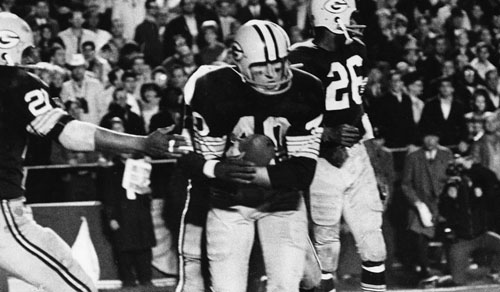
Brown cradles his interception. Brown said afterward he had been assigned the duty of guarding Reeves on the final drive. On the final play, I lost Reeves. Then I saw Hayes on the left, and Clarke on the right. Meredith threw it up in the air between them just before he was tackled, and I was just right there. God, yeah! Tom said to himself as he cradled the pigskin.
Robinson: I got a good grip on Meredith's left arm and had part of his right arm when he got rid of the ball. I got sick to my stomach when he got the pass off. As far as I was concerned, the whole game was up in the air. But Meredith and I were falling when he got the ball off, sort of side arm, and I could not see what was happening. All I could see was Meredith. The first thing I heard was the crowd. I jumped up and saw Brown getting up with the ball. Robinson felt he did not play Meredith as well as he might have. Any time you get your hands on a quarterback, he should not get off a ball. ... I thought I had blown it when he got the ball into the air. Later on, Tom said, Dave made an outstanding play. But there was nothing spectacular about mine. My wife could have caught the ball.
Meredith said Robinson's "strong move to the outside" took away the run part of the pass-run option he called and left him with only one receiver, Hayes, in the end zone.
Clarke: The (fourth down) play is one that I still wonder about to this day. On short-yardage plays anywhere on the field or in goal-line situations on the field, I was always the tight end. Bob Hayes would come out of the game. ... On this particular play, the tight end was supposed to block LB Dave Robinson. For some reason or another—and it stunned me, I couldn't figure it out—Tom Landry sent Bob Hayes into the game for me. ... I was already on the field, so I was getting ready to line up for that short-yardage play. And I couldn't figure out what was going on. I thought, "This is unlike Tom to try something different. Not in a situation like this." Perhaps I should have said, "Excuse me, Coach ... but what's going on? Is this what you want to do? ... And on that particular play, Bobby Hayes, who had never done this before, had never even practiced doing it, basically he didn't know what to do. Robinson ... just brushed by Bobby like he wasn't even there ... I was trying to figure out, "Did he choke? Was it a situation where Tom Landry, the head coach, lost his concentration for the moment?" ... There was every reason to believe if we had scored that touchdown, we were going to win in overtime.
Gent:
You have to make the decisions on the field. If you've got half your players paralyzed to move because they are afraid of what the coach is going to say, then Frank Clarke is going to stand there on the sideline when he should be in the game, and Danny Reeves is going to stay in the game when he should take himself out.
Dial: After the game, I came off the field, and I walked up to Landry, and they showed that picture before every broadcast of me talking to Landry after the game. Aw, I can't say what I called him. ... I called him an ill-advised name. I had a little single-bar face mask, and I was right in his face. It was very embarrassing for me when they replayed that. But we wanted to win so bad. You never saw so many guys cry after a ballgame as we did after that one. I blamed Landry for making the wrong call. ... And I really wonder, because that was the type of play I had made all my life. And it was thrown to the other side. And essentially that was the end of my playing career.
|
Statistics
- The Cowboys outgained the Packers 418-367 and in first downs 23-19.
- Dallas ran 71 plays to Green Bay's 52.
- Led by Perkins' 108y, Dallas prevailed on the ground 187-102.
- But the Cowboys had two turnovers to one for Green Bay, including Grabowski's fumble return touchdown that proved to be the difference in the game.
- Landry's men also committed six penalties to two for the visitors.
Postgame
Packers
- Lombardi: I was surprised they scored that many points on us. We knew we had to get some points. We can get points when we have to. Asked whether he expected a high scoring game, Vince replied, I think so. We had to respect their offense, and we had to go out and make points. I think in the first half we were looking at them, and they were running. We were like a spectator. They were busting tackles on us. ... This team has something more than respect for each other. There is a better word than respect - the word is love. I've said it before, but I'll repeat it because it's true. There is love on this ball club. It's not any one individual who does it. There are a lot of unselfish fellows on this team, and everyone plays a part in the responsibility.
- Starr walked through the locker room door and yelled, How sweet it is!, an unusual show of emotion from such a reserved man. He told reporters: We had a pretty good game plan. It was working, and we stayed with it. ... The Cowboys were real rough. It was a real all-out effort by both teams. Boy, am I tired. Asked about his above-normal 28 passes, he replied, Well, the progress of the game play dictates it. We were throwing and being successful, so we stuck with it. But you don't ever plan just to throw like that. The game plan dictated it. He said he had no preplanned receivers to throw to. I try to hit whoever is open. ...
Bart had particular praise for Dale, who snagged five passes for 128y. He was getting open all day.
Paul Hornung, who spent the day on the sideline with a pinched nerve in his neck, put his arm around Starr. I've never seen you any better, especially in a pressure game.
- Caffey praised the opponent. The Cowboys are by far the best team we've played all year. They have the most explosive offense you'll see. We had 'em by 14, and all of a sudden it's tied up. ... I sure didn't think there'd be that much scoring. I thought 21 points would win this game. ... On the goal-line stand: Down there, man, it was love, pure love. We knew we could stop them.
- Robinson sat on his stool, receiving congratulations from teammates. Lombardi came over and stared at him, unsmiling.
Later, in private, the perfectionist coach hugged his linebacker and praised him for the game-saving play. But he told him, You weren't supposed to be blitzing! Vince knew what I did was successful, said Robbie. But he would never say that. He graded everyone's performance with pluses or minuses. He gave me a minus two on the play. But I would have done it again. I respected Vince's system, but at that moment, I was more interested in the "W." Years later, Dave admitted, The danger is, if I missed him, he could have walked into the end zone.
Cowboys
- Landry: We had our chance down there and muffed it. It was just one of those things. Concerning the false start penalty: We just got over-anxious, that's all. We thought we were going to score and win, and I believe we would have won it. Tom thought his club had the momentum in the closing minutes so that, if they had scored, they would have won in overtime. We tried as hard as we could all the way through there. ... Green Bay is a real good team, and it's no embarrassment to lose to them. But still we had our chances. We made a couple of errors that hurt.
Gent on Landry's play-calling at the end of the game: Tom was great until game time. Then he was a mess. I always got a kick out of the public perception of Tom as cool as a cucumber. Believe me, I know he wasn't because I was a play messenger for him. He'd send me in with goal line plays at midfield and long-yardage plays on the goal line. He'd call plays we didn't have for players we didn't have. Sometimes Meredith would just wave the play messenger back to the sidelines. I mean, it was a genius system ... But the point is, Tom couldn't run the offense from the sideline. He needed a Meredith or Staubach who ultimately would challenge the System.
- Meredith: I'm proud of our effort. We'll be back in this game again. ... We were well prepared. My only reget is that we were on the short end of the score.
Asked if the Cowboys altered their game plan after falling 14 behind, he replied, No. It happened so early, and we knew we had a lot of ball game left. ... I don't think it affected our play. He also praised his opposite number. I think Bart had as fine a day as I've ever seen him have.
Years later, Frank Clarke summarized the 1966 title game this way: They knew they would win, and we knew they knew that. The difference was that we thought we could win, but we didn't know that we could win.
He also talked about the mood of the locker room afterward. It was like a wake, like somebody had died. And I could not relate to that. I didn't say it to anybody, but here I was thinking, "Wow, this is not right. This is really weird." We had had a fine season. We had reached many of our goals. We had even surpassed some of them. And here we had just played one of the best teams in the history of the sport. There had been no NFL playoff game quite like that since 1958, and we had every reason to be proud and pleased with how we had done ... I wondered, "Why are we feeling like this? This does not make sense. ... Is this going to help us, or is this going to tear us down?" 'Cause I felt as if the coaching leadership at that point should have praised us. It would have been a great spot for one of the coaches to say something about the wonderful season we had just had, and that winning or losing that game at that point didn't have anything paramount to do with what we had accomplished. And it wasn't there, and it really took something out of me ... I had just played maybe the finest offensive game I had ever played ... I caught four or five passes ... and I blocked well ... I didn't express this to anyone because it didn't seem as though the other guys felt that way. I wondered, "Why was our Cotton Bowl locker room so damn dismal after the game?" ... And in the papers, Landry wasn't praising us. He was saying, "We blew it." ... I don't know. Tom might have seen his faux pas for leaving Hayes in for me on that key play. He might have been feeling so responsible that he couldn't bring himself to say what he might have otherwise said to his team after such a great season ...
References: The Dallas Cowboys: Winning the Big One, Steve Perkins (1972)
Starr: My Life in Football: Bart Starr with Murray Olderman (1987)
God's Coach: The Hymns, Hype, & Hypocrisy of Tom Landry's Cowboys, Skip Bayless (1990)
Landry's Boys: An Oral History of a Team and an Era, Peter Golenbock (1997)
When Pride Still Mattered: A Life of Vince Lombardi, David Maraniss (1999)
Nitschke, Edward Gruver (2002)
Magnificent Seven: The Championship Games That Built the Lombardi Dynasty, Bud Lea (2002)
Bart Starr: When Leadership Mattered, David Claerbaut (2004)
A Cowboy's Life, Bob Lilly with Kristine Setting Clark (2008)
America's Quarterback: Bart Starr and the Rise of the National Football League, Keith Dunnavant (2011)
Chronicles of a Dallas Cowboys Fan: Growing Up with America's Team in the 1960s, John Eisenberg (2012)
|
Football Magazine
Memorable Games Archives - I
1912: Carlisle @ Army
1921: Centre @ Harvard
1924: Michigan @ Illinois
1929: Rose Bowl
1939: Texas Tech @ Centenary
1940: Bears @ Redskins
1941: Sugar Bowl
1941: Willamette @ Hawaii
1964: Alabama @ Georgia Tech
Memorable Games Archives - II
1947: Eagles @ Cardinals
1953: Iowa @ Notre Dame
1959: Oklahoma @ Northwestern
1966: Notre Dame @ Michigan State
1967: Ice Bowl (Dallas @ Green Bay)
1971: Nebraska @ Oklahoma
Memorable Games Archives - III
1967: Unlikely Hero (Super Bowl I)
1968: "Harvard Beats Yale 29-29"
1969: Believe in Bo
(Ohio State @ Michigan)
1974: "Who Won the Damn Game?" (Ohio State @ Michigan State)
1979: "You Shoulda Passed" (Sugar Bowl)
1980: Revenge Is Sweet (Kentucky @ Tulane)
1985: Greatest Finish No One Knows About (Principia @ Illlinois College)
Memorable Games Archives - IV
1982: Kellen Gives His All (Chargers @ Dolphins)
1982: The Dolphins Wuz Robbed (Dolphins @ Patriots)
1984: No Tie for Tom (Orange Bowl)
1985: Let Sleeping Beavers Lie (Oregon State @ Washington)
1993: "Game of the Century" a Week Later (Boston College @ Notre Dame)
1997: Why It's Called "Foot"-ball (Nebraska @ Missouri
Memorable Games Archives - V
1948: The Snow Bowl (Cardinals @ Eagles)
1958: The Game That Made the NFL (Colts @ Giants)
1962: NFL Championship Game
1984: "We Don't Want No Stinkin' field goal"
(Florida-Miami)
Memorable Games Archives - VI
1929: Ernie's Record-Setting Day (Cardinals @ Bears)
1934: Gopher Deception (Minnesota @ Pitt)
1939: Why Didn't You Kick? (UCLA-USC)
1942: We Will Have Our Rose Bowl Trip!
1943: Sid Luckman Day (Bears @ Giants)
1952: Evy Surprises Woody (Ohio State @ Iowa)
1956: Unlikely Hero (Rose Bowl)
1963: Birth of Instant Replay (Army-Navy)
1965: A Day to Remember (49ers @ Bears)
Memorable Games Archives - VII
1942: East-West Shrine Game
1943: Del Monte Pre-Flight @ Pacific
1949: Notre Dame @ SMU
1950: The Snow Bowl (Michigan @ Ohio State)
1965: Chiefs @ Oilers
1969: Texas @ Arkansas
1970: Oregon @ UCLA
1972: Auburn vs Alabama
1984: Holiday Bowl
1986: Auburn @ Florida
Golden Rankings Home
|




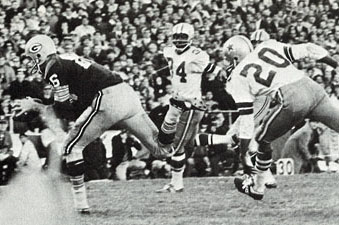
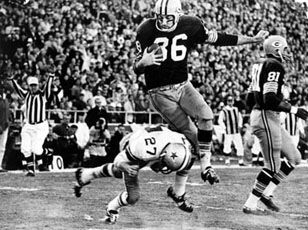
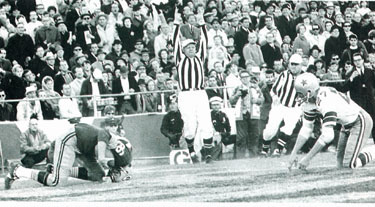
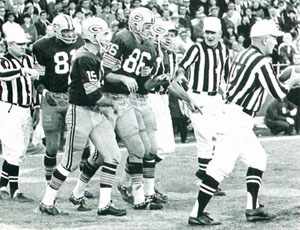

















 Cornell Green just misses the touchdown pass to Carroll Dale.
Cornell Green just misses the touchdown pass to Carroll Dale.



















